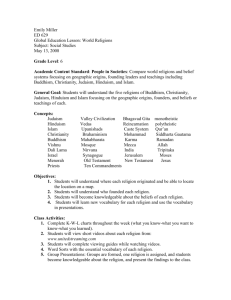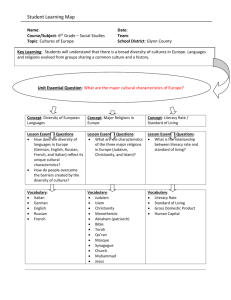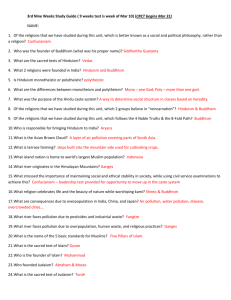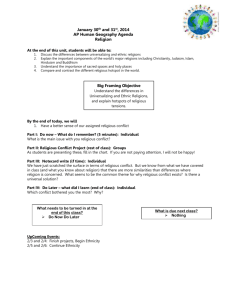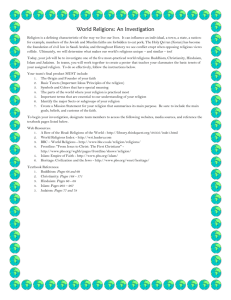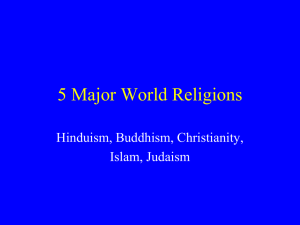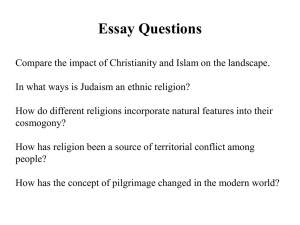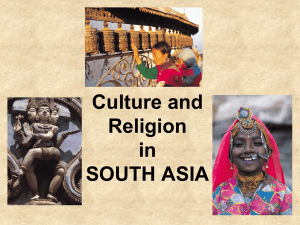Religion Practice MC Exam
advertisement
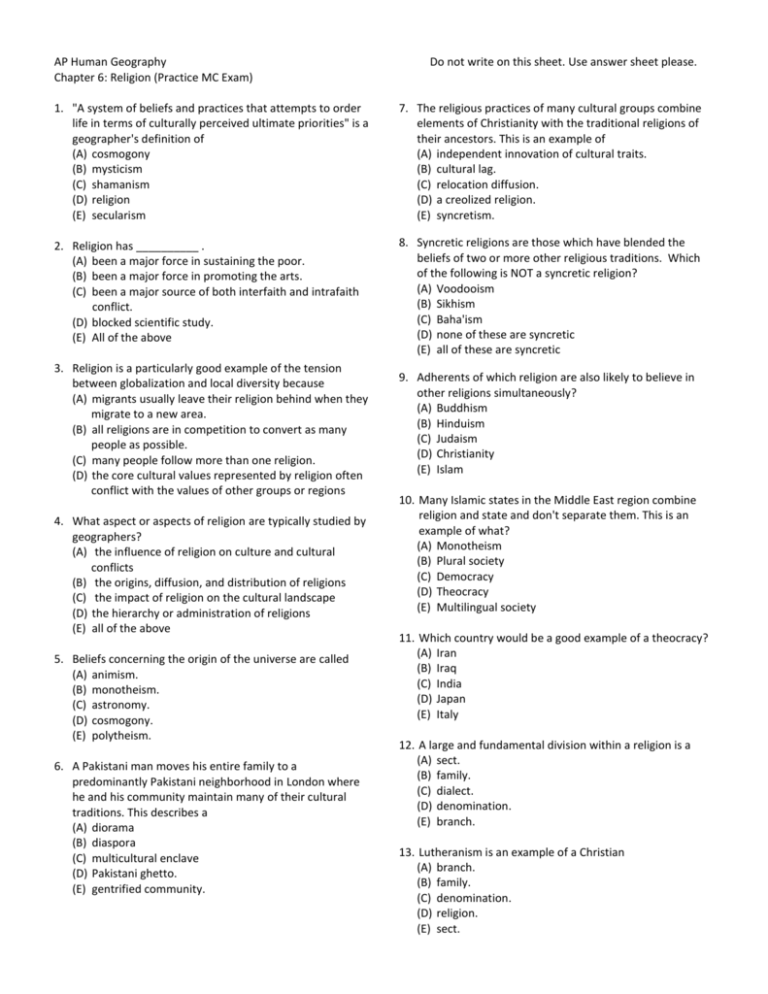
AP Human Geography Chapter 6: Religion (Practice MC Exam) Do not write on this sheet. Use answer sheet please. 1. "A system of beliefs and practices that attempts to order life in terms of culturally perceived ultimate priorities" is a geographer's definition of (A) cosmogony (B) mysticism (C) shamanism (D) religion (E) secularism 7. The religious practices of many cultural groups combine elements of Christianity with the traditional religions of their ancestors. This is an example of (A) independent innovation of cultural traits. (B) cultural lag. (C) relocation diffusion. (D) a creolized religion. (E) syncretism. 2. Religion has __________ . (A) been a major force in sustaining the poor. (B) been a major force in promoting the arts. (C) been a major source of both interfaith and intrafaith conflict. (D) blocked scientific study. (E) All of the above 8. Syncretic religions are those which have blended the beliefs of two or more other religious traditions. Which of the following is NOT a syncretic religion? (A) Voodooism (B) Sikhism (C) Baha'ism (D) none of these are syncretic (E) all of these are syncretic 3. Religion is a particularly good example of the tension between globalization and local diversity because (A) migrants usually leave their religion behind when they migrate to a new area. (B) all religions are in competition to convert as many people as possible. (C) many people follow more than one religion. (D) the core cultural values represented by religion often conflict with the values of other groups or regions 9. Adherents of which religion are also likely to believe in other religions simultaneously? (A) Buddhism (B) Hinduism (C) Judaism (D) Christianity (E) Islam 4. What aspect or aspects of religion are typically studied by geographers? (A) the influence of religion on culture and cultural conflicts (B) the origins, diffusion, and distribution of religions (C) the impact of religion on the cultural landscape (D) the hierarchy or administration of religions (E) all of the above 5. Beliefs concerning the origin of the universe are called (A) animism. (B) monotheism. (C) astronomy. (D) cosmogony. (E) polytheism. 6. A Pakistani man moves his entire family to a predominantly Pakistani neighborhood in London where he and his community maintain many of their cultural traditions. This describes a (A) diorama (B) diaspora (C) multicultural enclave (D) Pakistani ghetto. (E) gentrified community. 10. Many Islamic states in the Middle East region combine religion and state and don't separate them. This is an example of what? (A) Monotheism (B) Plural society (C) Democracy (D) Theocracy (E) Multilingual society 11. Which country would be a good example of a theocracy? (A) Iran (B) Iraq (C) India (D) Japan (E) Italy 12. A large and fundamental division within a religion is a (A) sect. (B) family. (C) dialect. (D) denomination. (E) branch. 13. Lutheranism is an example of a Christian (A) branch. (B) family. (C) denomination. (D) religion. (E) sect. 14. A relatively small group that has broken away from an established church is a (A) sect. (B) dialect. (C) family. (D) branch. (E) denomination. 21. Which of the following is an example of an ethnic religion? (A) Islam (B) Mormonism (C) Buddhism (D) Judaism (E) Roman Catholicism 15. Animists believe that (A) people should make complete use of the Earth's resources. (B) enlightenment can be achieved by all people. (C) natural disasters are preventable. (D) people should complete God's creation of the Earth. (E) inanimate objects and natural events have spirits. 22. All of the following are ethnic religions in Asia EXCEPT (A) Shintoism (B) Daoism (C) Confucianism (D) Buddhism (E) Hinduism 16. ________ is movement or attitude stressing strict and literal adherence to a set of basic principles. (A) fundamentalism (B) sect (C) branch (D) religion (E) heresy 17. Which of the following religions is a monotheistic religion? (A) Hinduism (B) Shintoism (C) Animism (D) Judaism (E) Buddhism 18. Which of the following religions is a polytheistic religion? (A) Judaism (B) Zoroastrianism (C) Christianity (D) Islam (E) Hinduism 19. Which of the following is NOT generally a characteristic of an ethnic religion? (A) It is found in a particular culture. (B) It is always polytheistic. (C) It appeals primarily to one group of people in a particular place (i.e. is spatially concentrated). (D) It does not seek outside converts. 20. In ________ religions, community, common history, and social relations are inextricably intertwined with spiritual beliefs. (A) monotheistic (B) local (C) evangelical (D) ethnic (E) universalizing 23. A universalizing religion (A) is based on the physical characteristics of a particular location on the earth’s surface (B) appeals to people living in a wide variety of locations (C) is rarely transmitted through missionaries (D) is usually found in less developed countries (E) all of the above 24. Which statement about universalizing religions is correct? (A) A universalizing religion is one into which people are born. (B) A universalizing religion is usually easy to join. (C) A universalizing religion seeks converts from other religions. (D) A and B only. (E) B and C only. 25. Which of the following religions did NOT originate with a founder or innovating prophet? (A) Buddhism (B) Hinduism (C) Islam (D) Taoism (E) Confucianism 26. The agricultural calendar (seasons of planting, harvest, etc.) is relatively unimportant to which type of religions? (A) animist (B) ethnic (C) pagan (D) universalizing 27. Which of the following is NOT a universalizing religion? (A) Islam (B) Mormonism (C) Judaism (D) Buddhism (E) Christianity 28. All evangelical religions are also universalizing religions. Which religion demonstrates that the reverse is not always true (i.e. is example of a nonevangelical, universalizing religion)? (A) Christianity (B) Buddhism (C) Protestantism (D) Polytheism (E) Hinduism 29. The five largest religions in order of number of adherents are (A) Christianity - Hinduism - Islam - Sikhism - Judaism (B) Islam - Christianity - Hinduism - Judaism - Sikhism (C) Buddhism - Christianity - Islam - Hinduism - Sikhism (D) Christianity - Islam - Hinduism - Buddhism - Sikhism (E) Christianity - Buddhism - Hinduism - Judaism – Islam 30. Numerically speaking, which of the following religions has the smallest number of adherents? (A) Judaism (B) Christianity (C) Islam (D) Hinduism (E) Buddhism 31. Which religion is the fastest growing of the world's five primary religions? (A) Christianity (B) Islam (C) Judaism (D) Hinduism (E) Buddhism 32. Islam is the fastest growing religion in the world today primarily because of (A) high birthrates. (B) contagious diffusion. (C) relocation diffusion. (D) cultural convergence. (E) forced conversions 33. The world's most widely distributed religion is (A) Islam. (B) Animism. (C) Christianity. (D) Hinduism. (E) Buddhism. 34. Which of the following world religions is the LEAST spatially distributed (i.e. most clustered)? (A) Buddhism (B) Christianity (C) Islam (D) Judaism (E) Hinduism 35. The oldest major religion is (A) Hinduism. (B) Judaism. (C) Buddhism. (D) Christianity. (E) Islam. 36. The youngest major religion is (A) Hinduism. (B) Judaism. (C) Islam. (D) Christianity. 37. Which of the following religions is matched most correctly with its hearth? (A) Christianity-Italy (B) Buddhism-Northeastern India/Nepal (C) Islam-Egypt (D) Judaism-Iran (E) Hinduism-Tibet 38. What two areas are the hearths of all of the world's five primary religions? (A) Southern India and Eastern China (B) Southwest Asia and Northern Africa (C) Central Europe and Southwest Asia (D) Northern India and Southwest Asia (E) Eastern China and Southern Europe 39. Which of the following is currently the most important religion in the homeland of the man who founded it? (A) Shintoism (B) Buddhism (C) Islam (D) Hinduism (E) Christianity 40. (AP Exam) The world's three major monotheistic religions originated in which of the following regions? (A) East Asia (B) Southwest Asia (C) Eastern Europe (D) Western Europe (E) Africa 41. Which of the following religions does NOT trace its origins to the patriarch Abraham? (A) Judaism (B) Islam (C) Hinduism (D) Christianity deity humans nature 42. The cosmographical design shown above is best associated with what religion or religions? (A) Buddhism (B) animism (C) Christian/Judaism/Islam (D) all of the above (E) none of the above 43. Christianity first diffused from its hearth through (A) hierarchical diffusion. (B) expansion diffusion. (C) relocation diffusion. (D) contagious diffusion. (E) all of the above 44. The three major branches of Christianity are (A) Roman Catholic, Coptic Church, Eastern Orthodox (B) Roman Catholic, Armenian, Protestant (C) Roman Catholic, Protestant, Latter Day Saints (D) Roman Catholic, Protestant, Eastern Orthodox (E) Roman Catholic, Protestant, Maronite 45. The branch of Christianity that has been resurrected and is growing rapidly in Russia, Eastern Europe and many Slavic countries is: (A) Catholicism (B) Protestantism (C) Eastern Orthodox (D) Shaker (E) Unitarianism 46. Which of the following does NOT qualify as a Protestant denomination? (A) Presbyterianism (B) Methodism (C) Catholicism (D) Southern Baptist (E) Lutheran 47. Almost 90 percent of people in the Western Hemisphere claim adherence to (A) Protestantism. (B) Eastern Orthodoxy. (C) Roman Catholicism. (D) Christianity. 48. Numerically speaking, which of the following Christian groups is the largest? (A) Southern Baptist. (B) Eastern Orthodox. (C) Roman Catholic (D) Anglican/Episcopalian. (E) Lutheran. 49. (AP Exam) The principal religion of Central and South America is (A) Eastern Orthodoxy (B) Roman Catholicism (C) Buddhism (D) Islam (E) Protestantism 50. Which of the following regions is the most solidly Roman Catholic? (A) Latin America (B) North America (C) Europe (D) Central Africa (E) Australia/Pacific Islands 51. Which characteristic distinguishes religion in Latin America from religion in North America? (A) Latin America has a smaller zone of extant (surviving) indigenous, tribal religions. (B) Christianity in Latin America diffused primarily from the British Isles whereas Christianity in North America diffused primarily from Spain. (C) Latin America has a Roman Catholic majority (D) Latin America has a Protestant majority 52. All of the following groups consider themselves to be minor Christian branches and are correctly matched with their regions, EXCEPT: (A) Coptic, Egypt (B) Marionites, Lebanon (C) Parsee, Iran (D) Ethiopian, Ethiopia (E) Mormon, Utah 53. Muslims trace their origins through Abraham's son (A) Aaron (B) Saul (C) Solomon (D) Ishmael (E) Isaac 54. The hearth and spiritual center of Islam is at (A) Baghdad. (B) Cairo. (C) Jakarta (D) Mecca (E) Jerusalem 55. Islam diffused across the Eastern Hemisphere through (A) war. (B) trade (C) missionaries. (D) migration. (E) all of the above. 63. (AP Exam) A country in which the majority of the population are Shiite Muslims is (A) Iran (B) Morocco (C) Saudi Arabia (D) Egypt (E) Indonesia 56. Adherents of which religion controlled much of present day Spain until 1492, but not since then? (A) Buddhism (B) Christianity (C) Hinduism (D) Islam 57. Which of the following regions is predominantly Muslim? (A) North Africa (B) Middle East. (C) Indonesia (D) Central Asia (E) All of these. 58. Approximately 50% of the world's Muslims live in what four countries OUTSIDE of the Middle East (A) Indonesia, Pakistan, Bangladesh and Malaysia (B) Indonesia, Pakistan, Sudan and Malaysia (C) Indonesia, Sudan, Malaysia, and India (D) Indonesia, Malaysia, India and Pakistan (E) Indonesia, Pakistan, Bangladesh and India 64. Shaded areas on the map above indicate different religions. Nigeria, Chad, and Sudan, are all shown with north-south divides. What religion predominates in the north of these countries? (A) Animism (B) Animism and Christianity together (C) Sunni Islam (D) Shia Islam (E) Sunni and Shia Islam together 59. Which of the following countries is NOT one of the largest Muslim populations outside the Middle East? (A) Indonesia (B) Pakistan (C) Bangladesh (D) Brazil (E) India 65. In which of the following countries does Islam predominate in the north while traditional tribal religions predominate in the south? (A) Iraq (B) Sudan (C) Malaysia (D) Egypt 60. The dominant branch of Islam is (A) Sunni. (B) Druze. (C) Eastern Orthodoxy. (D) Sikh. (E) Shiite. 61. (AP Exam) Which of the following countries has the largest number of Sunni Muslims? (A) Saudi Arabia (B) Bangladesh (C) Egypt (D) Iran (E) Indonesia 62. The world's largest dominantly Islamic state is (A) Iran. (B) Pakistan. (C) Egypt. (D) Indonesia. 66. (AP Exam) All or nearly all of the population of the shaded land region on the map above avoid which of the following foods? (A) Beef (B) Poultry (C) Pork (D) Corn (E) Rice 67. The Hajj, one of the "pillars of Islam," is (A) charitable giving (B) fasting during the holy month (C) the veil worn by Muslim women (D) the pilgrimage to Mecca (E) the five daily prayers 68. Recent diffusion of Islam into Europe (beyond Spain and Portugal), South Africa, and the Americas has largely been a result of __________ (A) proselytizing. (B) forced migration. (C) relocation diffusion. (D) favorable European Union policies. (E) the collapse of the Soviet Union. 69. Since the fall of Communism in the former Soviet Republics some of the newly created countries are struggling with the degree to which new laws should reflect the influence of Islam, or remain secular. Examples of these republics include: (A) Croatia and Slovenia (B) Poland and Lithuania (C) Kazakhstan and Uzbekistan (D) Mongolia and Tibet (E) all of the above 70. Which of the following religions is NOT an important religion in India? (A) Christianity. (B) Hinduism. (C) Sikhism. (D) Buddhism. (E) Islam. 71. The two primary Eastern religions of Hinduism and Buddhism each have their hearths located where? (A) Jerusalem, Israel (B) Western Saudi Arabia (C) Eastern China (D) Southeast Asia (E) Northern India 72. Hinduism arose in the _____________ River valley. (A) Indus (B) Ganges (C) Brahmaputra (D) Krishna 73. One of the unique characteristics of Hinduism is that it (A) is so young. (B) is a very simple religion. (C) emerged without a prophet, book of scriptures, and without evolving a bureaucratic structure comparable to those of the Christian religions. (D) has so few followers. 74. The caste system in Hindu India is (A) a social structure based upon a social hierarchy in which a person is born into a caste and cannot change castes during their lifetime (B) an economic class which poor people can work and earn money to raise their position in society (C) a political party system strongly tied to economic class divisions such as blue-collar and white-collar workers (D) regional cultural divisions dominated by Hindispeakers from northern India (E) a colonial social structure created by British rulers and imposed from the 1800s through the 1940s until independence 75. All of the following helped loosen the social barriers of the caste system except __________ . (A) the coming of other religions to India. (B) the work of Mahatma Gandhi. (C) the effects of modernization during the colonial period. (D) the United Nations. (E) affirmative action policies. 76. Hinduism has not spread by expansion diffusion in modern times, but at one time it did spread by relocation diffusion as a result of (A) the transportation of Indian workers abroad during the colonial period. (B) conquest by military groups. (C) forced relocation by Islamic invaders. (D) missionary activities overseas. 77. Which of the following can be considered the “parent” religion to Buddhism? (A) Hinduism. (B) Sikhism. (C) Islam. (D) Christianity. (E) Shintoism. 78. Buddhism has its source in (A) India. (B) Japan. (C) China. (D) Thailand. 79. Mahayana Buddhists are found primarily in (A) China, Japan and Korea (B) Tibet and Mongolia (C) Cambodia, Laos and Myanmar (D) Sri Lanka and Thailand (E) C and D 80. Theravada (also known as Hinayana) Buddhists are found primarily in (A) China, Japan and Korea (B) Tibet and Mongolia (C) Cambodia, Laos and Myanmar (D) Sri Lanka and Thailand (E) C and D 81. How are Buddhism and Hinduism similar? (A) Both religions believe in a judgment day and rewards in heaven. (B) Both religions believe in magic and divination. (C) Both religions believe in a rigid class system (caste system). (D) Both religions believe in karma and re-incarnation. (E) All of the above 82. How are Buddhism and Hinduism different? (A) Buddhists practice meditation; Hindus reject the practice of meditation. (B) Hindus have a rigid caste system; Buddhists reject the caste system. (C) Hindus believe in reincarnation; Buddhists believe in a heaven. (D) Buddhists believe in ahimsa (non-violence), while Hindus do not believe in nonviolence. (E) Buddhists are polytheists; Hindus are monotheists. 83. Which of the following is NOT true of the effects of the Chinese Communist takeover of Tibet? (A) a communist was installed as leader of Tibetan Buddhism (B) the influence of monks was greatly reduced and monasteries destroyed (C) Tibet was reformed politically as a province of China, and a communist government was installed (D) thousands of Tibetan Buddhists fled to India as refugees (E) roads, hospitals, and schools were modernized 84. Sikhism is a religion that arose from the confrontation between: (A) Buddhism and Islam (B) Islam and Hinduism (C) Christianity and Islam (D) Judaism and Hinduism (E) Hinduism and Buddhism 85. The majority of Sikhs are located in the ________ region of India. (A) Punjab (B) Bangalore (C) Delhi (D) Ganges (E) Bengali 86. What was the first major religion known to espouse monotheism? (A) Islam (B) Christianity (C) Hinduism (D) Judaism 87. The concept of a ghetto originally referred to the area of a city (A) inside the walls. (B) where Jews were forced to live. (C) inhabited by the lowest-income people. (D) where the untouchable caste lived. (E) where most blacks lived. 88. Which statement best describes the distribution of the Jewish population in the world? (A) Nearly 90% of all Jews in the world live in Israel. (B) Most Jews live in Russia and Eastern Europe (C) About half of all Jews live in Israel, the rest are concentrated in urban areas of Europe and North America (D) About half of all Jews live in European cities, the rest live in Israel. (E) Only one-quarter of all Jews live in Israel, the rest are concentrated in North America. 89. The teachings of Lao-Tsu form the tenants of (A) Confucianism. (B) Hinduism. (C) Taoism. (D) Islam. 90. Especially important in Taoism is (A) ethical principles and behavior. (B) reflection on the mystical and magical aspects of nature. (C) daily reading of sacred texts. (D) belief in one all-powerful God. 91. Especially important in Confucianism is to (A) ethical principles and behavior. (B) reflection on the mystical and magical aspects of nature. (C) daily reading of sacred texts. (D) belief in one all-powerful God. 92. Zoroastrianism is similar to Islam and Christianity in that it (A) is monotheistic (B) is based on a strict dualism of good vs. evil (C) believes that history will culminate in the return of a savior figure (D) is based on the teachings of a prophet (E) all of the above 93. Which of the following is NOT associated with the Baha'i faith? (A) diffusion through relocation diffusion (B) a universal message (C) sacred sites in the Muslim/Christian/Jewish holy land (D) decline in recent decades (E) temple structures on all inhabited continents 94. Animism in Africa is declining rapidly as it gives way to what two other major world religions? (A) Islam and Christianity (B) Islam and Buddhism (C) Buddhism and Judaism (D) Judaism and Islam (E) Christianity and Buddhism 95. In Europe, many Catholics are less likely to attend church or be active in their religious community. This is due to the rise of (A) Protestantism. (B) Shamanism. (C) Cultural Indifference (D) Atheism. (E) Secularism. 96. The rise of secularism and decline of religious membership are found primarily in (A) Europe. (B) Africa. (C) Southwest Asia. (D) Southeast Asia. 97. Which of the following is NOT true of the effects of the Communist Revolution of 1917 on Orthodox Christianity in Russia? (A) church buildings and property were nationalized (B) all people were ordered to discontinue the practice of religion (C) the church was not allowed to carry out social and cultural work (D) anti-religious policies were adopted by the government (E) religious practices become increasingly uncommon among younger generations 98. Which of the following U.S. region-religion associations is NOT correct? (A) New England—Catholic (B) South—Baptist (C) Upper Midwest—Lutheran (D) Southwest—Mormon 99. Where in the United States does Roman Catholicism dominate? (A) southern New England (B) Southwest (C) Pacific Northwest (D) Southeast (E) A and B 100. (AP Exam) Which of the following religions is predominant in the states of Wisconsin, Minnesota, and North Dakota? (A) Catholic (B) Mormon (C) Lutheran (D) Baptist (E) Methodist 101. Catholics comprise 25% of all North Americans. Which Protestant group is largest among the remaining Christians? (A) Methodists (B) Latter-day Saints (C) Lutherans (D) Presbyterians (E) Baptists 102. In terms of religious diversity, __________ are among the least diverse U.S. states. (A) Florida and Oregon (B) Illinois and Wisconsin (C) Texas and Kansas. (D) Utah and Massachusetts (E) Washington and Ohio X # Y # Z # Identify the religion based on its geographical distribution as shown on the map above. 103. What is religion X? (A) Roman Catholic (B) Lutheran (C) Baptist (D) Methodist (E) Latter-day Saint (Mormon) 104. What is religion Y? (A) Roman Catholic (B) Lutheran (C) Baptist (D) Methodist (E) Latter-day Saint (Mormon) 105. What is religion Z? (A) Roman Catholic (B) Lutheran (C) Baptist (D) Methodist (E) Latter-day Saint (Mormon) 106. Which is true about the relationship between culture, religion, and the physical environment (A) religion is no longer an important source of identification for a distinct cultural group. (B) religious beliefs are often responsible for changes people make to the physical environment. (C) all religions appeal primarily to people living in their land of origin. (D) few religions derive meaningful events from the physical environment. (E) All of the above are true. 107. The influence of religion on the cultural landscape can be seen in all following ways EXCEPT (A) places of worship. (B) burial grounds. (C) shrines and temples (D) commercial districts. (E) sacred sites. 108. The region characterized by a general lack of religious elements in the landscape is called a/an (A) autonomous religious landscape (B) secularized landscape (C) universalizing landscape (D) sectarian landscape (E) cosmogonic landscape 111. Why have the Chinese government begun to encourage cremation over burial of the dead? (A) Burials take up too much space in the cities that might otherwise be used for recreation. (B) Burials are reminder of death on the landscape. (C) Burials in China take too much space in the countryside that might otherwise be used for agriculture. (D) The elaborate funerals associated with burial are too expensive. (E) Burials are associated with Western democracies and popular culture. 112. Religious structures are designed for public worship and large congregations for which major religions? (A) Christianity and Islam (B) Islam and Buddhism (C) Buddhism and Hinduism (D) Hinduism and Islam (E) Buddhism, Islam, and Christianity 113. A mosque differs from a church, because a mosque (A) displays a variety of architectural styles. (B) is not considered a sanctified place (holy ground). (C) contains relics of the founder. (D) is not a place of worship. (E) is decorated with scenes from the life of the founder. 114. What religion is indicated by the silhouette to the left? (A) Islam (B) Christianity (C) Buddhism (D) Hinduism (E) Judaism 109. Which of the following does NOT represent a traditional religious method of the disposal of the dead? (A) inhumation (burial) (B) cremation (C) exposure (D) burial at sea (E) all represent such methods 115. Which is NOT a feature of Islamic sacred architecture? (A) minarets (B) adoption of Roman models of design (C) the influence of the architecture of other civilizations (D) geometric and calligraphic ornamentation (E) frescoes depicting the life of the prophet 110. In which religion is cremation rather than burial of the dead practiced? (A) Islam (B) Christianity (C) Judaism (D) Hinduism 116. Everyday worship in Hinduism is most likely to take place (A) at a holy shrine (B) as part of a pilgrimage (C) at home (D) in a pagoda (E) in a temple 117. This structure (left) is associated with which world religion? (A) Judaism (B) Roman Catholicism (C) Hinduism (D) Buddhism (E) Islam 118. Jerusalem is a sacred place for (A) Jews. (B) Muslims. (C) Christians. (D) all of the above 119. The Temple Mount and the al-Haram al-Sharif are __________. (A) sacred sites for Hindus. (B) the same site. (C) located in Mecca. (D) located in Medina. (E) located in Tel Aviv. 125. Which is an example of an intrafaith (boundary) conflict? (A) Israel—Palestine (B) Former Yugoslavia (C) Northern Ireland (D) Nigeria 126. The conflict over religion in Ireland is between (A) Protestants and Catholics (B) Catholics and Orthodox Christians (C) Orthodox Christians and Protestants (D) Anglicans and Presbyterians (E) Anglicans and Episcopalians 127. Protestants in Ireland are (A) highly integrated with the Roman Catholic population. (B) dispersed throughout the island. (C) highly clustered in one part of the island. (D) recent immigrants from Great Britain. (E) A and B 120. The place represented in the image above is (A) the Red Mosue of Islamabadq (B) the al-Kabah Mosque in Mecca (C) the Hagia Sofia in Istanbul (D) the Blue Mosque in Istanbul (E) the Dome of the Rock (al-Asqa Mosquin Jerusalem 121. Jerusalem is to Christians as ____________ is to Hindus. (A) Mumbai (B) Delhi (C) Varanasi (aka Benares) (D) Tokyo 122. What do Hindus consider to be the holiest river? (A) the Indus (B) the Ganges (C) the Tigris (D) the Nile 123. Buddhist pilgrimages to Bodh Gaya are focused on (A) the birthplace of Siddhartha Gautama. (B) a Bhodi tree under which the Buddha taught. (C) a Shrine to Krishna. (D) the grave of the Buddha. 124. Which of the following holy sites is NOT correctly matched with its religion? (A) Western Wall: Judaism (B) Dome of the Rock: Islam (C) City of Mecca: Islam (D) Golden Temple of Amritsar: Bahai’ism (E) St. Peter’s Cathedral (Vatican City): Christianity 128. Jerusalem's geography represents a particularly difficult religious conflict to resolve because (A) The Israeli government has separated the most sacred sites with a massive concrete wall. (B) the population of Jerusalem is majority Christian but surrounded by majority Jewish and Muslim populations on either side. (C) Israel captured the Sinai peninsula from Egypt. (D) Sacred sites for Jews and Muslims are literally built one on top the other. 129. The ideology of Zionism has as its goal (A) the merger of Judaism with other religions. (B) the merger of the three modern divisions of Judaism. (C) a homeland for the Jewish people. (D) the elimination of the Orthodox division within the faith. 130. Palestinians include all of the following groups EXCEPT (A) residents of territories occupied by Israel (B) residents of refugee camps outside of Israel (C) citizens of other states calling themselves Palestinians (D) Jewish citizens of Israel (E) Muslim citizens of Israel 131. Israel has controlled all of Jerusalem since (A) partition of Palestine by the United Nations in 1947. (B) the withdrawal of British rule in 1948. (C) the Arab-Israeli armistice of 1949. (D) the Egyptian and Israeli peace treaty of 1979. (E) the Six-Day War in 1967. 132. Nigeria is a multilingual country with many tribal boundaries where Christianity prevails in the south and________ in the north. (A) Judaism (B) Buddhism (C) Sikhism (D) Hinduism (E) Islam 133. In which country is the freedom of religion generally NOT considered endangered or seriously challenged today? (A) Burma/Myanmar (B) China (C) Turkmenistan (D) Iran (E) India 134. Which is NOT a characteristic of a hierarchical religion? (A) It encourages each congregation to be self-sufficient. (B) Regional administration is located in large cities. (C) It organizes territory into local administrative units. (D) It has a well-defined hierarchical structure. (E) It fosters interaction among different congregations. 135. Which pair of religions are both considered hierarchical religions? (A) Roman Catholicism and Mormonism. (B) Mormonism and Southern Baptist. (C) Mormonism and Islam. (D) Roman Catholicism and Islam. (E) Southern Baptist and Islam. 136. Baptist and Islam are examples of (A) hierarchical religions (B) ethnic religions (C) animistic religions (D) autonomous religions (E) theocratic religions 137. Which religion is the most autonomous? (A) Hinduism (B) Buddhism (C) Orthodox Christianity (D) Roman Catholicism (E) Islam 138. Administration of the Roman Catholic church is hierarchical. Which of the following describes the geographical hierarchy from largest unit to smallest? (A) church archdiocese diocese parish (B) archdiocese diocese church parish (C) archdiocese diocese parish church (D) parish diocese archdiocese church (E) church parish diocese archdiocese

